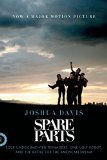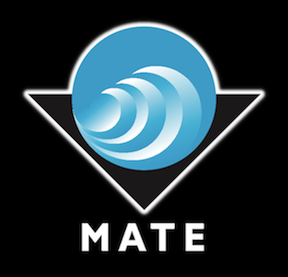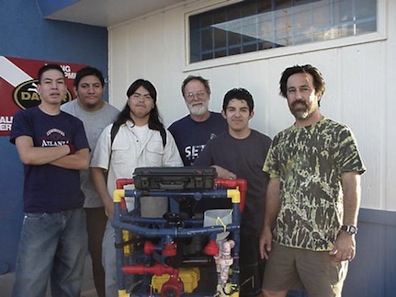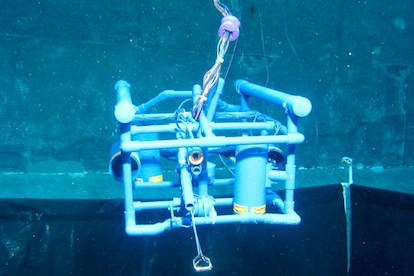Summary | Excerpt | Reading Guide | Reviews | Beyond the Book | Read-Alikes | Genres & Themes | Author Bio
Four Undocumented Teenagers, One Ugly Robot, and the Battle for the American Dream
by Joshua Davis

Critics' Opinion:
Readers' Opinion:
First Published:
Dec 2014, 240 pages
Paperback:
Dec 2014, 240 pages
 Book Reviewed by:
Book Reviewed by:
Rory L. Aronsky
Buy This Book
This article relates to Spare Parts
 On June 25, 2004, in its third year, the Marine Advanced Technology Education (MATE) Remotely Operated Vehicle (ROV) Competition, sponsored by NASA and the Navy, was underway at the University of California, Santa Barbara. Carl Hayden Community High School's team (see review of Spare Parts) was a part of this competition.
On June 25, 2004, in its third year, the Marine Advanced Technology Education (MATE) Remotely Operated Vehicle (ROV) Competition, sponsored by NASA and the Navy, was underway at the University of California, Santa Barbara. Carl Hayden Community High School's team (see review of Spare Parts) was a part of this competition.
 MATE, based at Monterey Peninsula College in Monterey, California, began its mission in 1997 to improve marine technical education by taking part in developing courses and programs with marine industries, high schools, community colleges, universities, and research institutions, as well as connecting employers and students. The theme of MATE the year that Carl Hayden's students entered was a fictional take on the sinking of U-157, a U-boat that sank in the Caribbean in 1942. Students were expected to use their ROVs to explore the submarine underwater (recovering the captain's bell and two "lost" pieces of research equipment), find out the temperature of a cold-water spring, and take a sample of liquid from some secret-cargo barrels.
MATE, based at Monterey Peninsula College in Monterey, California, began its mission in 1997 to improve marine technical education by taking part in developing courses and programs with marine industries, high schools, community colleges, universities, and research institutions, as well as connecting employers and students. The theme of MATE the year that Carl Hayden's students entered was a fictional take on the sinking of U-157, a U-boat that sank in the Caribbean in 1942. Students were expected to use their ROVs to explore the submarine underwater (recovering the captain's bell and two "lost" pieces of research equipment), find out the temperature of a cold-water spring, and take a sample of liquid from some secret-cargo barrels.
This year's competition, to be held from June 25-27 in Newfoundland and Labrador, focuses on the Arctic. According to the MATE website, students will be tasked with counting species and sampling organisms, collecting data about an iceberg, deploying an instrument, replacing a corroded section of oil pipeline and preparing a wellhead for the delivery of a Christmas tree, testing the grounding of anodes on the "legs" of an oil platform, controlling the flow of oil through a pipeline, and measuring the height of a wellhead.
 The classes remain the same as in 2004. The Explorer class is open to students in community and technical colleges and four-year universities; the Ranger class is for middle and high school students in grades 5 to 12; the Navigator class accommodates home schooled students, afterschool programs, clubs and others; and, finally, the Scout level is open to elementary school students from kindergarten through 4th grade. The Explorer and Ranger classes can participate in the international competition.
The classes remain the same as in 2004. The Explorer class is open to students in community and technical colleges and four-year universities; the Ranger class is for middle and high school students in grades 5 to 12; the Navigator class accommodates home schooled students, afterschool programs, clubs and others; and, finally, the Scout level is open to elementary school students from kindergarten through 4th grade. The Explorer and Ranger classes can participate in the international competition.
As it has been with every MATE competition before 2004 and since, the goals remain the same. MATE wants to introduce students to the wealth of marine fields, their purposes, and possible careers in those fields. MATE aims to help students develop the skills necessary to be considered for those careers, including troubleshooting, management, thinking critically, and solving problems. To that end, they look to bring together students and their teachers with employers and professionals in those fields. They also strive to increase students' understanding of what Remotely Operated Vehicles can do in those fields.
MATE competitors and subjects of Spare Parts Oscar Vazquez, Luis Aranda, Cristian Arcega, (teacher) Allan Cameron, Lorenzo Santillan, and (teacher) Fredi Lajvardi, courtesy of Phidgets
2008 MATE competitor KealakeheTeam's ROV named 'Io o Hohonu Kai, courtesy of Tomas Krasuski
Filed under Medicine, Science and Tech
![]() This article relates to Spare Parts.
It first ran in the February 4, 2015
issue of BookBrowse Recommends.
This article relates to Spare Parts.
It first ran in the February 4, 2015
issue of BookBrowse Recommends.





The Funeral Cryer by Wenyan Lu
Debut novelist Wenyan Lu brings us this witty yet profound story about one woman's midlife reawakening in contemporary rural China.
Your guide toexceptional books
BookBrowse seeks out and recommends the best in contemporary fiction and nonfiction—books that not only engage and entertain but also deepen our understanding of ourselves and the world around us.